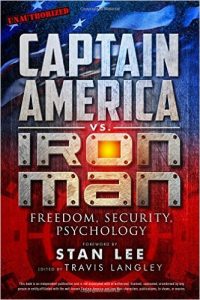Personal freedom versus national security—it’s a debate that rages on the Congressional floor, at the Supreme Court bench, and across the inked pages of one of Marvel Comic’s most popular graphic novel series and recent blockbuster movie, Captain America: Civil War. In the comic, superheroes must decide whether to sign a national registry of their powers.
A new book, Captain America vs. Iron Man: Freedom, Security, Psychology, unleashes scholars upon the subject with a collection of essays. Psychologists delve deeper into the debate, examining everything from how trauma shapes a hero’s view to the codes of masculinity that heroes face. Illinois State University’s Eric Wesselmann and J. Scott Jordan dedicate a chapter to arguing that the conflict goes beyond the simple idea of sacrificing privacy for safety. Instead, they explore the psychology of morality that rests at the heart of the series.
“We assume morality is cut and dried,” said Wesselmann, an assistant professor of psychology. “We have moral systems that we adopt—whether they be sacred or secular—and as soon as we adopt them, we think that morality is simple. But we live in a world of ambiguity. We are constantly working through things.”
If we can influence the way people encounter this material, what better gig is there? —Scott Jordan
When it comes to Civil War, Wesselmann noted the comic writers and filmmakers encouraged the audience to begin with preconceived notions about which side was morally right. Filmmakers even based advertising on the theme “Whose side are you on?” and sold merchandising for Team Cap or Team Iron Man. Creators then begin to challenge those allegiances. “As the story emerges, we realize that no side is completely right or wrong,” said Wesselmann. “The creators wanted people to question their initial choices. Both heroes make good points, and both ultimately do morally questionable things.”
The new book, edited by Travis Langley, is part of a series that explores the psychology of popular culture, including Star Wars, The Walking Dead, Game of Thrones, and Batman. Wesselmann and Jordan, both comic book fans, met Langley at Wizard World Convention in Chicago where Langley gave a talk on the psychology behind The Walking Dead comics. “I was impressed with insights on post-traumatic stress disorder (PTSD), and analyzing the characters form The Walking Dead in that light,” said Jordan.
Langley asked them to collaborate on a new book dedicated to Civil War. In their book chapter, called “Wild Heroes: The Hard Work of Being ‘Moral,’” Wesselmann and Jordan reviewed classic and modern takes on the psychology of moral thinking. They interwove these ideas with a theory Jordan coined called “wild systems.” Developed by Jordan, wild systems theory rejects the idea that morality can be developed to an unwavering point where it will not change.
“Most people teach morality as a cognitive development, meaning you keep going until you reach a maximum level of morality,” said Jordan, a professor of psychology, who instead views an individual’s identity as a continuous social struggle. “We argue that people are dealing with multiple levels of social pressure every day, and that doesn’t go away. There is no ultimate goal or finish line.”
To minimize the inner conflict in the face of continuous moral decisions, people tend to organize their lives in a way to avoid contradictions, said Jordan. “For example, all of us may not like the political situation in the Middle East, but we still continue to drive our cars, even though oil is key to the crisis. We may hate the working conditions in China, but we still have an iPhone,” he said. “We organize our lives so we don’t see the results of our actions in the every day. We conform our lives so that we don’t have to encounter aspects of culture that generate contradictions.”
The superheroes in Civil War find themselves making alliances with sketchy characters and vigilantes, all in the name of winning a moral right. “Like the characters in Civil War, we convince ourselves we are doing something for a ‘higher purpose,’” said Wesselmann. “This helps us justify our actions, and reduce the anxiety that comes with moral dissonance.”
Both Jordan and Wesselmann are self-proclaimed fans of popular culture, and were pleasantly surprised by the reaction to Langley’s Civil War book. The two took part in a panel on the book at the 2016 Wizard Con. “It was standing room only,” said Jordan. “There were hundreds of people, and they wanted to talk about the characters and morality. They were asking us about psychology with these characters as a tool. If we can influence the way people encounter this material, what better gig is there?”
Jordan and Wesselmann are teaming up again for chapters in upcoming Langley books on Star Trek and Wonder Woman.




